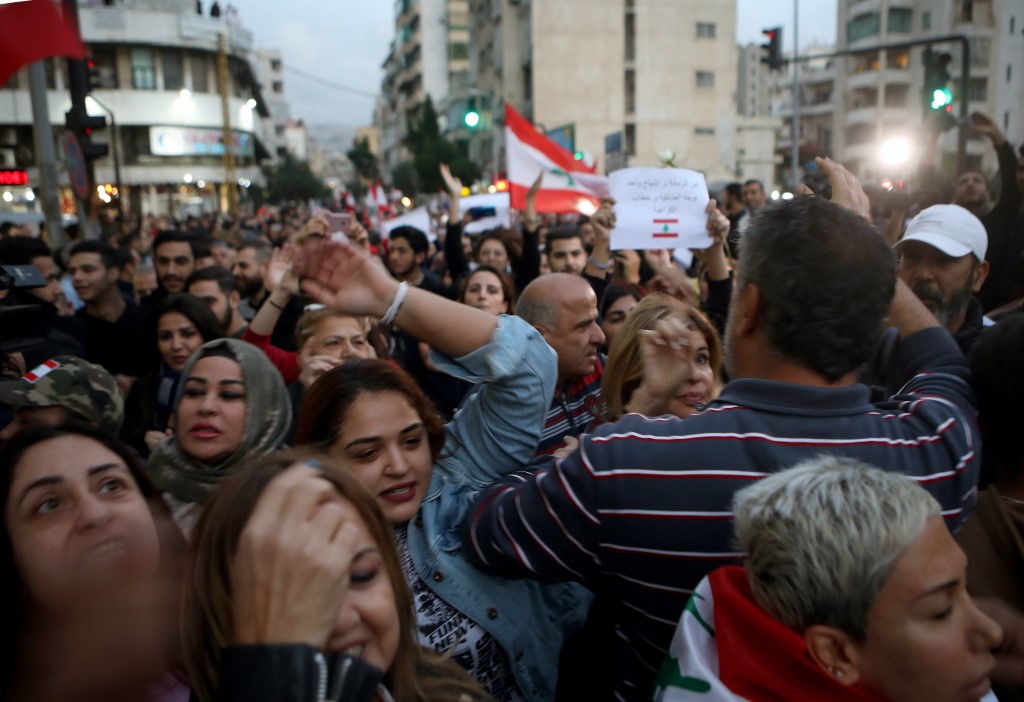Arab Spring 2.0: The people are showing the rulers how to govern

The new wave of protests rattling the Arab world signals the determination of a young generation to set new standards of accountability.
2011 marked a turning point in the Arab world, as young people took to the streets to demand freedom, democracy and economic empowerment. The so-called Arab Spring helped to dispel the myth that Arab countries were exceptional in their resistance to change from authoritarian to more democratic governments.
Promise of the Arab Spring
In hindsight, Arab societies - and especially Arab youth - overestimated their ability to stay the course that they had charted. The promise of the Arab Spring largely succumbed to deeply entrenched, resilient regimes and a lack of international support.
Western powers, ostensibly a natural ally of democratising forces, had mixed reactions to the revolts - mainly because the protests challenged the very strongmen the West supported as a bulwark against extremist Islamist groups.
Stay informed with MEE's newsletters
Sign up to get the latest alerts, insights and analysis, starting with Turkey Unpacked
In this new environment, the lack of a meritocracy, combined with the inability of the state to deliver basic public services, has become more salient and frustrating
As a result, the early hopes of the protests were replaced by disillusionment on the Arab street, coupled with weakening economic circumstances that added to the malaise. In countries such as Yemen, Libya and Syria, chaos ensued as internal rifts were quickly overpowered by battles playing out at the regional level.
In other countries, counter-revolutions were accompanied by severe repression and crackdowns on civil society. Even in Tunisia, which avoided a counter-revolution, a lack of political leadership coupled with a weak economy spawned widespread disillusionment.
The international community launched rescue programmes for countries that lacked the resources to cope with the economic downturns. Those programmes supported local authorities and mostly focused on macroeconomic stabilisation. They helped to reduce the widening internal and external economic imbalances, but did not change the basic dynamics that sparked the widespread protests: anaemic growth, limited job creation for a growing number of young people, and the monopolisation of the economy by the state, army or oligarchs.
Underlying economic problems
Other reforms, such as eliminating subsidies or introducing taxes, were largely ineffective in addressing the underlying, unfair economic structures. Even in the few countries that had higher growth, such as Egypt, poverty did not decline, leading to increased frustration and an enhanced belief that Arab economies remained in the throes of crony elites.
Eight years after the Arab Spring erupted, the quiescence that had accompanied the disillusionment - essentially returning the region to business-as-usual for its leaders - abruptly ended, as a new wave of protests hit Algeria and Sudan. The protests soon spread to Egypt, Lebanon and Iraq.
This came amid rising economic uncertainty that further dimmed prospects, especially for young people. The old social contract, in which the state would provide subsidies and public jobs, and citizens would in return tolerate having a limited voice and unaccountable governments, was shredded by nearly empty government coffers and intermittent to non-existent grants from rich Gulf neighbours.
Governments in the Arab world should take a clue from the protesters and show that they are willing to abide by much higher transparency and disclosure standards
In this new environment, the lack of a meritocracy, combined with the inability of the state to deliver basic public services, has become more salient and frustrating. There is little scope for increasingly educated youth and women to participate in the economy and society. It is difficult for would-be entrepreneurs or employees to access markets and credit, because state-owned enterprises or connected firms hog both.
Not only is this unfair, it also robs the economy of the vibrancy, investment and talent that excluded participants possess and incumbents do not.
Moreover, the inability of the state to deliver quality, affordable public services - from waste management, to water and electricity - erodes the possibility of improvement. Corruption and mismanagement are believed to be the culprit; the public perception that the state cannot improve things has created an urge to impose a new system of accountability.
The power of social media
The new wave of protests signals a sophisticated and contextualised approach to setting accountability standards for the state. The disillusionment that sprung from the elections that followed the 2011 uprisings led to a maturing of the demands and the modus operandi of protesters. Rather than relying on the vote, protesters turned to social media, which has provided a powerful vehicle for coordinating and voicing their demands.
Protesters have found their voice and seem ready for a permanent standoff with entrenched authorities - even though these protests have been banned or repressed to varying degrees in many countries. While there is a notorious lack of transparency on the part of Arab governments, the flow of information between citizens and the viral nature of social media has overcome that opacity, creating a substitute environment that promotes accountability.
Governments in the Arab world should take a clue from the protesters and show that they are willing to abide by much higher transparency and disclosure standards - which will ultimately help to reform bad behaviour by governments and elites, and foster trust among the citizenry.
The views expressed in this article belong to the author and do not necessarily reflect the editorial policy of Middle East Eye.
This article is available in French on Middle East Eye French edition.
Middle East Eye delivers independent and unrivalled coverage and analysis of the Middle East, North Africa and beyond. To learn more about republishing this content and the associated fees, please fill out this form. More about MEE can be found here.






